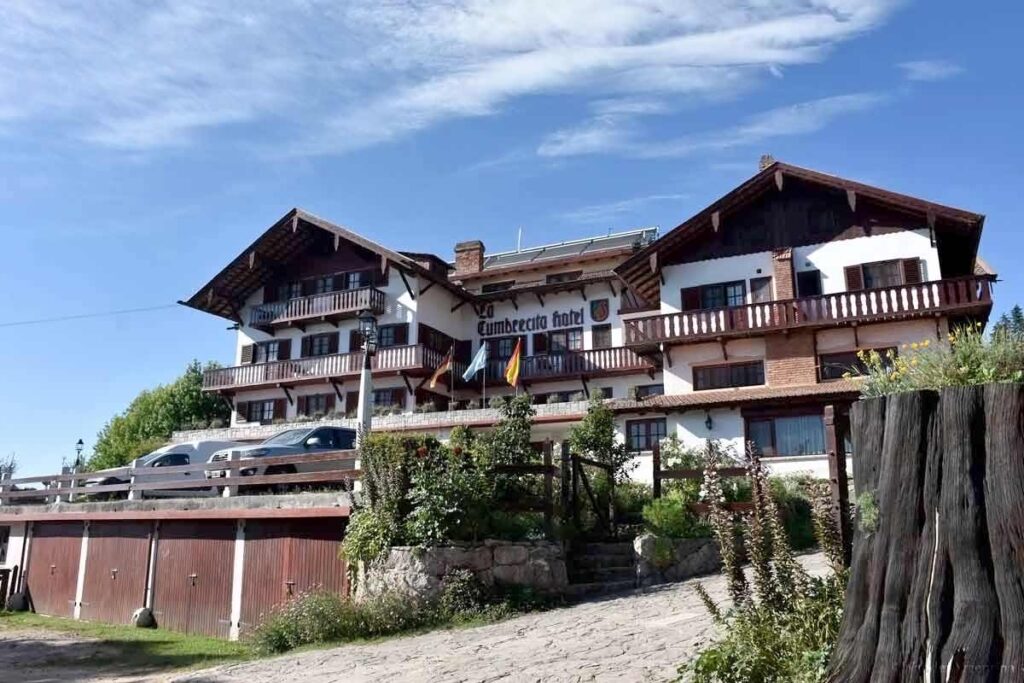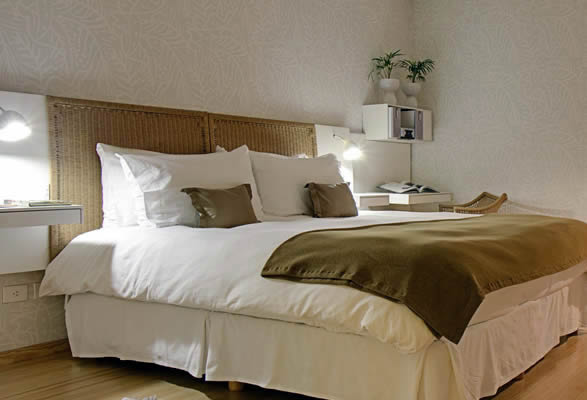Book Hotels & Hostels in Argentina Online
Accommodation options in Argentina run the gamut, reflecting the cultural richness and geographical diversity of the country.
From bustling Buenos Aires hotels with all modern comforts to quaint, locally-run boutique hotels and guesthouses that promise a more immersive experience, the range of accommodations will suit any traveler’s needs and budget.
Urban explorers can find solace in the stylish apartments nestled in the heart of Buenos Aires and other major cities.
Luxurious resorts in Mendoza wine country cater to those seeking relaxation and indulgence, while budget-friendly hostels align with the needs of backpackers traversing the Andean trails.
Patagonia’s remote cabins offer a peaceful retreat for nature lovers but there are also five-star options such as the famed Llao Llao Hotel near Bariloche.
The range of transitional and boutique hotels, lodges and hosterías doesn’t even include the explosion of Airbnb in recent years.
Whether coming for a short vacation, as a slow traveler or a digital nomad stay, visitors to Argentina will find that the choice between traditional hotels and Airbnbs can significantly impact the flavor and convenience of their experience.
In this guide, we’ll navigate the nuances of securing the perfect spot for your stay, delving into the unique aspects of booking accommodations in Argentina to ensure you make an informed decision that helps, not hinders your travel plans.
Finding a Landing Pad in Buenos Aires
Most people visiting Argentina will take a long flight into Buenos Aires and need to make their way from the airport (¡we offer airport pickup!) to their hotel or Airbnb.
When booking your flight, consider what time you will be landing.
Booking accommodation in advance online to ensure a safe landing after a long flight, boat or bus ride is obvious to all but the most spontaneous travelers.
But if landing in the morning, remember most places won’t allow check-in until the afternoon.
Hotels will typically allow you to leave your bags with them until check-in time.
If using Airbnb, this may not be possible, so message the host to ask.
Being tired and saddled with luggage for hours in a huge, unfamiliar city is not a good initial scenario.
Those who know they won’t get any sleep on the flight might consider if they have the wherewithal to go until the 3 p.m. check-in time without taking a siesta.
One little-known siesta contingency plan is the possibility of going to a short-term love hotel known as a telo to take a nap (yes, you can do that).
Where to Stay in Buenos Aires: Neighborhoods
The first thing to consider if landing in Buenos Aires is what part of town to stay in.
To simplify it: for most, it usually boils down to a choice between the sprawling and hip Palermo, on the north side of the city, or the historic and bohemian San Telmo on the south side.
Palermo is a large neighborhood and some sections are quieter than others.
Palermo Hollywood is an excellent option as most streets are quiet, but it is also conveniently located near many great steakhouses and speciality restaurants. Home Hotel is a good option here.
Palermo Soho has nice areas too, although there is more action on the street and a little less tree coverage.
Their peripheral neighborhoods in Buenos Aires such as walkable Belgrano (great for families); the quiet and convenient Colegiales, and the traditional aristocrats neighborhood of Recoleta.
The city’s upscale Puerto Madero appeals more to business travelers, but it is also worthy of consideration, depending on your tastes and preferences.
Even though Buenos Aires is a huge city, any of these neighborhoods will be convenient once you discover Buenos Aires’ inexpensive transportation system of subways and buses that cost about U.S.$.50 a ride or less abundant taxis and ridesharing services.
In smaller towns in Argentina, some places aren’t open year-round, close for siesta or get overbooked for special events, such as the yearly Gaucho Festival in San Antonio de Areco.
When this happens, travelers can show up at a destination and find nobody around or no rooms available.
That is how the owner of this blog ended up sleeping in a nice family’s scary spider-filled garage one night in Cafayate!
In Argentina cash is still king in most cases, but one exception is accommodation.
If you pay with a credit card online or in person for larger hotel chains in Argentina, you will receive a refund of the 21% sales tax automatically.
If you don’t book online but pay in Argentina, the hotel may include the taxes and you will have to request a refund retroactively on your way out at the airport.

Booking Traditional Hotels & the Blue Dollar
Argentina’s parallel currency market, known as the ‘Blue Dollar,’ now has a reduced impact on accommodation costs thanks to the credit card (or MEP) rate, which is often around 10 percent lower than the black market rate and/or Western Union rate for exchanging foreign cash.
Booking online can be beneficial for foreign travelers as it automatically exempts them from the 21% VAT tax.
Paying for accommodation on-site in cash can become more complex.
Hotels may insist on charging the 21% VAT for cash payments, a fee that is usually waived with online bookings.
So utilizing the Blue Dollar rate for cash transactions to pay for hotels used to be beneficial before the MEP credit card rate was introduced in 2023.
Now any potential savings of paying with cash are offset by the VAT charge.
Smaller hotels and guesthouses might be willing to negotiate rates off the books (common in Argentina), so you can save a bit of money paying cash in that scenario if you deem it’s worth the hassle.
Using Apartment Online Share Services Such as Airbnb/VRBO in Argentina
Airbnb is a popular option in Argentina these days. In Buenos Aires, as in other cites around the world it has co-opted the normal rental market.
The city of Buenos Aires and the whole country’s appeal as a destination for tourists and digital nomads alike has led to a surge in properties being converted into holiday rentals.
The way it is run in Argentina, it is more like an alternative real estate platform than a peer-to-peer platform.
In theory, Airbnb enables travelers to cut out the local middleman so that they can rent directly from owners, but the reality is many are run by professional ‘Airbnb agents.’

—> See some of our picks for places to stay in Buenos Aires
Still, it has the benefit of making the local short-term rental market more competitive and accessible to travelers.
The biggest liability with Airbnb in Argentina for short-term stays is that it is a bit of a gamble to book an apartment site unseen.
If Airbnb has quality control issues occur in the developed world, it’s even worse in Argentina.
No one wants to arrive at an Airbnb and discover a nightclub thumping till the wee hours right next door, or the air-conditioning doesn’t work or even the electricity is cut.
Finding a ‘superhost’ and a place with good reviews can increase the chance an Airbnb will be adequate, but it has also become clear that people shy away from leaving bad reviews as it can affect one’s use of the platform to get a reputation as a fussy guest.
Sometimes you have to read between the lines when checking out reviews.
The ‘Airbnb Effect’ in Buenos Aires
The effect of Airbnb in Buenos Aires mirrors that of other places with significant tourist influxes, where the short-term rental market thrives at the expense of local housing needs.
This drives up housing prices and diminishes the availability of long-term rentals available for local residents.
As property owners opt to list their units on short-term rental platforms to capitalize on higher returns, the traditional rental market shrinks.
The Pros and Cons of Airbnb in Argentina
| Pros | Cons |
|---|---|
| Space — usually have more space and cooking facilities | Lack of Amenities – Airbnb won’t have front desk help and rarely a pool/gym. |
| Competitive prices: Airbnb’s can be more cost-effective (depending on variables). | Consistency – in Argentina, it is more likely to have unforeseen problems such as street noise or not having items, internet or working appliances |
| ‘Live like a Local’ – this can be a more authentic experience | Unanticipated problems may result in taking away the enjoyment of vacation |
Apartment Hunting for Longer Term Stays
Renting an apartment and staying for a few months allows visitors to truly immerse themselves in the local lifestyle and experience all that Argentina has to offer.
In this case, ‘slow travelers’ seeking to immerse themselves in a destination may find Airbnb is the path of least resistance.
Since it dominates the market, most temporary rentals are on the platform.
Also, it is notoriously difficult for foreigners to rent apartments for longer stays in Argentina due to antiquated property laws that require a renter to already have a property deed, called a ‘garantía‘ to a local property to secure a lease.
Airbnb alleviates the issue of securing a deed, having to pay a deposit, first month’s rent and a large commission to a real estate agent.
Rental laws designed to lock in the cost of rent when inflation is soaring further discourage landlords from renting to locals because those laws don’t apply to temporary short-term rentals.
Argentina’s quirky rental laws plays right into the hands of opportunistic real estate agents, who extract exorbitant fees that negate any potential savings from finding a low-cost apartment rental for just a few months.
On the normal long-term rental market, rentals are required to have a three-year contract and the apartments come bare-boned: they often don’t include appliances such as an oven, which involves further cost.
But it can be a gamble – Airbnb rentals in Argentina come with their own unique risks.
While you may score a stylish loft in San Telmo or a condo with a pool in Palermo, there’s always the chance of encountering some unpleasant surprises, like cockroaches, sketchy owners, or a last-minute cancellation that leaves you cranky and in a frantic search for a new place to stay.

Then you begin a possible odyssey of dealing with their customer service automation before getting hold of a human for a resolution, a scenario that can make for a bitter Airbnb user real quick.
Having a problem in a foreign country where you don’t speak the same language as the host isn’t the ideal scenario but you can use Google Translate to text.
Make sure to document everything and for any Airbnb-related problems.
The best Airbnb Customer toll-free Service number is +1-844-234-2500.
Booking
The hotel and hostel metasearch engines we use on this website only have verified reviews (unlike pages such as Trip Advisor, where anyone can leave a review).
This means that you can trust that the customer ratings are by real customers — not friends doing a favor, nor the complaints lodged by the business owners’ bitter enemies.
Booking is a trusted hotel booking engine founded as a start-up in the Netherlands, now part of the Priceline travel group.
They work with not only chain hotels, but many smaller family hotels, B&Bs, guest houses and even boats with sleeping facilities.
One of the reasons people like to book with this company is because they don’t have any reservation fees, have great rates, and instant confirmation and canceling reservations is easy.
Expedia is a travel fare aggregator and meta-search engine that allows travelers to book flights and hotels. It made Fortune magazine’s ‘World’s Most Admired Companies’ list and sometimes has great deals, it depends though.
Hotels Combined
Hotels Combined is the world’s largest hotel metasearch engine with a great selection of accommodations in South America that includes hotels, resorts, apart-hotels and cabins throughout Argentina.
Just like with the other hotel booking engines, you get a 21% VAT tax off if you book online.
In addition, sometimes you’re able to book a hotel and pay on cash on arrival– this is a great way to avoid paying with a credit card and getting heavily taxed, as you can just pay with money exchanged at the blue dollar rate.
House-Hunting Argentina: Long-Term Apartment Rentals
For those looking to rent on a longer-term contract will require research and due diligence.
Traditional real estate agencies with webpages such as Zonaprop offer a selection of both short-term and two-year contract apartments.
The biggest drawback to local market is that you’ll need the first month’s rent, deposit, and hefty commission fees.
Just keep in mind that these longer-term rental options come unfurnished and are barebones.
Another alternative is to seek out independent real estate agents who speak English and specialize in rental properties for foreigners.
This route provides more personalized service, but you’ll need to be prepared to open your wallet a bit wider.
Local Options for Apartment Hunting Online
Another option is to search online groups on social media with terms in Spanish such as ‘Alquiler-Temporario.’
Those in the market to purchase an apartment or house rather than rent might have better luck on a site called Solo Dueños.
This platform allows people to rent or buy directly from owners, cutting out the middleman.
The website has a decent filtration system for rentals and sales, though it can be a bit outdated and clunky to navigate.
Some listings may no longer be accurate – the prices and availability can be hit or miss.
For renters and buyers, cutting out real estate commissions can result in significant savings.
Word of Mouth
Another time-honored tradition in Argentina’s rental market is word of mouth.
Your Argentine friend’s aunt’s cousin’s neighbor might have a killer apartment that is just sitting empty.
If you happen to know the right people (or know someone who knows the right people), you just might stumble upon a nice place that beats out overpriced Airbnb listings and shady real estate agents.
Overall, while Argentina’s rental landscape may seem like a maze, a bit of extra homework and persistence can pay off in the form of more affordable accommodations.
It’s just a matter of finding the right fit for your needs and budget.
→ Should You Get Travel Insurance for Argentina?’
Hostels & Hospitality Communities
For those on a budget, nothing beats hostel hopping.
Hostelworld is the world’s largest hostel search engine and pretty much the only option for specifically booking hostels online.
Hotellook, by the creators of budget airlines search engine, Jetrader is a hotel search engine that includes hotels, hostels as well as small apartments and guesthouses that don’t appear in larger search engines.
Some of the best hostels are Milhouse Hostel, which is a well-oiled machine as the family that runs it has been at it a long time.
Couchsurfing used to be fairly active for events and meetups in a few cities of Argentina.
It wasn’t used as much for couchsurfing as in some other countries, because a lot of young people live with their parents.
When the Couchsurfing platform became a paid service it lost many users and its grassroots vibe, but there are still some people using it and Couchsurfing communities on Facebook and Reddit.
There are similar accommodation share platforms travelers can try such as BeWelcome, TrustRoots and the non-profit, Couchers but with the small number of users on these platforms, it can be hard to screen out bad actors.
Read about places we like to stay:
• Bariloche
• Buenos Aires
• Cachi
• Cafayate
• Iguazú
• Mendoza

